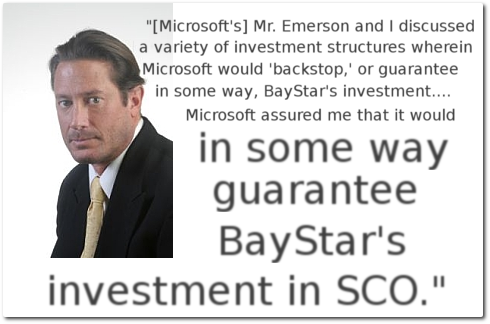

See Lawrence R. Goldfarb (Wikipedia)
IAM might soon lose some of its funding sources, namely patent trolls like Microsoft-armed, Nokia-fed bullies. They are simply not doing well. This might leave IAM growingly dependent on sucking Battistelli's udder for EPO favours and money. Either way, IAM too is unable to deny the trend.
"These are trolls working on behalf of a larger company, Ericsson in this case."Like Ericsson, Microsoft increasingly turns to trolls for coercion against competitors. Microsoft has the world's largest patent troll at its disposal, with literally thousands of satellites around it (to help mask the route back to Microsoft et al) and the original troll is finally dying, albeit it's spreading its patents to smaller trolls, much like a cluster bomb wherein munitions are patents. Microsoft is already building a business model around that, as we explained earlier this year [1, 2, 3, 4, 5, 6, 7, 8, 9, 10, 11, 12]. It attacks legitimate companies that actually manage to sell things; these companies are attacked not just via trolls but also directly sometimes. As Patently-O points out, Intellectual Ventures may have gotten itself reputation so bad that it stops operating on its own and just spreads the weapons to other entities. Patently-O is linking to IAM as its source, for IAM is a longtime friend of Intellectual Ventures.
"Patently-O is linking to IAM as its source, for IAM is a longtime friend of Intellectual Ventures."IAM, in the meantime, is revealing that yet another Microsoft-connected proxy/troll (which already attacked GNU/Linux vendors on numerous occasions; details in our Wiki) is collapsing. It tries to soften the blow by framing it as something that affects only Asia but inevitably says:
Acacia Research appears to have significantly restructured its Asia-Pacific business, with the departure of its most senior executive in the region and the possible closure of its Tokyo office.
Sonos has hired former senior IBM and Microsoft IP executive Tanya Moore to be its first chief licensing officer as the audio company looks to bolster its efforts in IP value creation. The business is a relative minnow in patent terms – according to Google patents the company has a little over 200 US patent applications and grants – but owns what Moore views as a critical portfolio for wireless home audio systems.